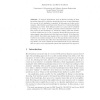Free Online Productivity Tools
i2Speak
i2Symbol
i2OCR
iTex2Img
iWeb2Print
iWeb2Shot
i2Type
iPdf2Split
iPdf2Merge
i2Bopomofo
i2Arabic
i2Style
i2Image
i2PDF
iLatex2Rtf
Sci2ools
DEXA
1995
Springer
1995
Springer
Knowledge Organization for Exploration
To support applications, such as efficient browsing in large knowledge bases and cooperative knowledge discovery in large databases, the concept of rule similarity is essential. In this paper we define such a measure, called distance, and then put in the service of various knowledge exploration processes. Rule distances allow us to place all the available knowledge on a “map”, in which proximity reflects similarity. Users can then browse in the knowledge, by iteratively visiting rules and examining their neighborhoods. In our cooperative knowledge discovery process, users suggest a hypothetical rule that has been observed. If the hypothesis is verified, the system may suggest other, even better, rules that hold; if refuted, the system attempts to focus the hypothesis until it holds; in either case, the system may offer other rules that hold and are close to the hypothesis. Our work is within the formal framework of logic databases, and we report on an experimental system that i...
Cooperative Knowledge Discovery | Database | DEXA 1995 | Knowledge Exploration Processes | Large Knowledge Bases |
Related Content
| Added | 26 Aug 2010 |
| Updated | 26 Aug 2010 |
| Type | Conference |
| Year | 1995 |
| Where | DEXA |
| Authors | Amihai Motro, Sylvie Goullioud |
Comments (0)

